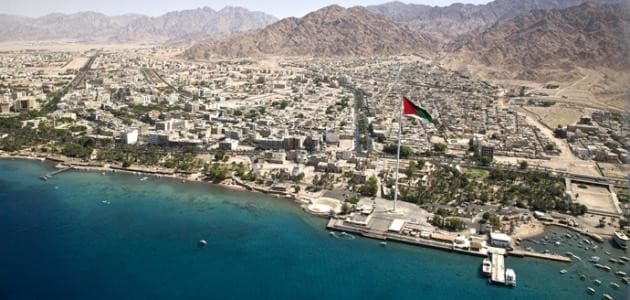On February 27, 2017, after the Islamic State (ISIS) in Sinai fired three Grad rockets at the Israeli town of Eilat on February 8, Fahad Al-Khitan, a senior columnist for the Jordanian daily Al-Ghad, warned that ISIS could just as easily target the Jordanian port town of Aqaba, with its vital and strategic facilities. Therefore, he said, Jordan must fight terrorism not only on its borders with Syria and Iraq but everywhere. He added that, in light of the Egyptian army's "modest" achievements against ISIS is Sinai, Jordan must not leave its security to the mercy of others.
The following are excerpts from his article:[1]

Aqaba (image: mawdoo3.com)
"We are combating terrorism not only on the northern and eastern fronts [meaning the Syrian and Iraqi borders], for not far from our southern border the threat of ISIS terrorism has emerged. The Egyptian army is waging a bitter war with this terrorist organization in Sinai, and for the past four years or so, there has been no end in sight to this unlimited conflict. Extremist organizations in Sinai have managed to establish their hold in the stony mountain regions, where fighting them is difficult. They have especially exploited the chaos on the Egypt-Libya border since the ouster of the Qadhafi regime in order to smuggle massive quantities of advanced weapons into Sinai. They have also managed to ensure the passage of fighters to Sinai from near and far regions, while relying on a complex networks of arms and drug dealers.
"Only a few weeks ago the terrorist organization [ISIS] sent a troubling message, whose potential future threat was felt by
"In light of the modest achievements made by the Egyptian army in its war against terrorist organizations, and the fact that [the terrorist organizations] can launch guided missiles, Jordan can no longer ignore the situation off its southern border, which is of great strategic importance. Aqaba is not only Jordan's sole sea port and a vital route for its imports and exports, but is also the location of the main concentration of the kingdom's energy sources – the natural gas depot, the tankers bringing in oil, and the [Aqaba] power plant.
"Due to these considerations, Jordan can no longer leave Aqaba's safety to the mercy of others. The relevant authorities have already taken the steps they can to protect the city's vital facilities, but since the terrorist organization may increase its military capabilities and consider expanding the scope of its action, Jordan must treat the [Aqaba] region as an area for military operations... We are not yet at the critical point of needing to recruit our resources, however meager, to deal with a danger that could spread in the future and threaten the interests of neighboring countries like
"Jordan still relies on the Egyptian army in order to avoid other scenarios and does not hesitate to provide all the help it can to eliminate the capabilities of armed terrorist organizations and reduce their threat as much as possible. However, the developing security challenge in the south reminds us how much the scope of terrorist threats has grown, and that the war against it must be all-encompassing and not restricted to [ISIS's strongholds] in Mosul, [Iraq] and Al-Raqqa, [Syria]. In the area surrounding
"On the domestic level, we must understand that we are waging open war with terrorism on all fronts... This is no picnic, since we pay the price of the failures of other countries and regimes with our [own] economy and security."
[1] Al-Ghad (Egypt), February 26, 2017.
[2] See MEMRI JTTM report ISIS-Sinai Claims Grad Rocket Attack On Eilat, February 9, 2017.





